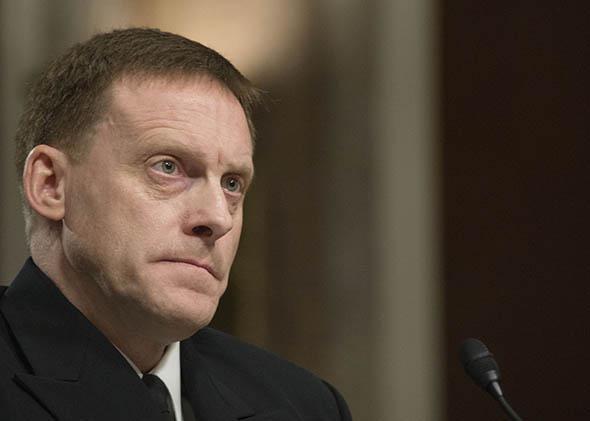This article originally appeared in the New America Foundation’s Weekly Wonk.
This week, the Obama administration unveiled its plans to put an end to the National Security Agency’s bulk collection of millions of Americans phone records. That’s a first step toward shutting down the most controversial of all the NSA programs revealed by former contractor Edward Snowden. While important details remain to be ironed out, and the plan still needs to be reconciled with a proposed bill in the House of Representatives, it now seems all but certain that the NSA will have to go to phone companies and ask for access to Americans’ data, rather than hold onto the records itself.
Settling that thorny issue may come as welcome news for Adm. Michael Rogers, whom President Barack Obama tapped in January to be the next director of the NSA and the next commander of U.S. Cyber Command, two of the most prominent and powerful positions in all of American intelligence. It wasn’t a surprise pick.
Indeed, Rogers had been groomed to become the next head of the NSA, the nation’s largest intelligence agency and its primary gatherer of signals intelligence—phone calls, emails, and other electronic communications. The Chicago native was already the head of signals intelligence for the Navy and in his 30-year military career has worked in that field as well as cryptology, the other pillar of the NSA’s mission.
But Rogers is also in charge of U.S. Fleet Cyber Command, the Navy’s cyber defense and warfare group. As such, he is both the Navy’s chief electronic spy and its top cyber warrior. That made him rarely suited among senior military officers to take over from Army Gen. Keith Alexander, who currently serves as both the NSA director and the head of Cyber Command. Both organizations work in tandem to penetrate foreign computer systems, steal information, and lay the groundwork for cyber attacks, which only the president, or, in rare cases, the secretary of defense, can authorize. They also work to protect U.S. computer systems from penetration by foreign governments and hackers.
Numerous experts, including President Obama’s own NSA review panel, which was established to investigate programs revealed by Snowden, have recommended that the NSA and Cyber Command be run by different people, arguing that this “dual-hatted” position gives too much power and authority to one person. Alexander became the first Cyber Command chief in 2010, after he’d been running the NSA for five years. Supporters for keeping the two positions linked say Cyber Command needs the NSA’s manpower—more than 30,000 employees worldwide—and its technical expertise in defending computer networks and launching computer attacks. To make both organizations work smoothly together, they need a single leader. That argument won out, and Obama rejected calls to have the NSA and Cyber Command run by separate people. If Cyber Command matures in the next few years and builds up enough staff and expertise to stand on its own, Rogers may be the last person to serve in both roles. But for now, he wears both hats and will arguably be the most influential and important intelligence official in the U.S. government once he is confirmed.
Rogers’ confirmation is all but guaranteed. But prior to the hearing held earlier this month, the big unanswered question was how he would navigate the tricky political waters in which the NSA now finds itself. The agency has never faced such intense public scrutiny or criticism of its normally secret activities. It will fall to Rogers to restore the agency’s credibility and manage the stream of leaks that shows no signs of abating. He will have some help in that regard from his new deputy director, Rick Ledgett, an NSA veteran who most recently led the agency’s task force investigating the Snowden leaks and assessing what damage they may have caused.
“The United States government … still [has] no idea what documents were provided to the journalists, what they have, what they don’t have,” Rogers told senators, striking a cautious, somewhat noncommittal tone. Snowden’s disclosures have given U.S. adversaries “greater insights into what we [the U.S. military and intelligence agencies] do and how we did it,” Rogers said. But he didn’t say how or what particular operations had been compromised. And asked whether he considered Snowden a “traitor,” Rogers sidestepped. “I don’t know that I would use the word ‘traitor,’ but I do not consider him a hero.
Rogers held his own in the hearing, and at least partly answered the question of whether he’s up for the political challenge of running the NSA in the affirmative. But there are still big operational challenges to come. Assuming Rogers is confirmed soon, it will fall to him to manage the plan for reforming the phone records program. He’ll also have to work hard to repair the agency’s relationship with U.S. technology companies and foreign governments, which have protested NSA’s spying on foreign leaders. There’s a cost to the revelations, both in terms of lost business and damaged reputations for the companies, and diplomatic strains with allies. Rogers can’t fix those problems on his own, but if he can defend the agency at the same time demonstrate that he’s listening to critics, he will start to repair the damage.
Those who know him have predicted that Rogers will come through unscathed. “He’s just a steady hand. You never saw a ruffled feather,” said retired Adm. Gary Roughead, who was the chief of naval operations when Rogers was the Navy’s intelligence director, a position that has been a stepping stone to the NSA. “As he has approached all things, he’ll do [the job] in a very thoughtful, principled way.”
This article is part of Future Tense, a collaboration among Arizona State University, the New America Foundation, and Slate. Future Tense explores the ways emerging technologies affect society, policy, and culture. To read more, visit the Future Tense blog and the Future Tense home page. You can also follow us on Twitter.
